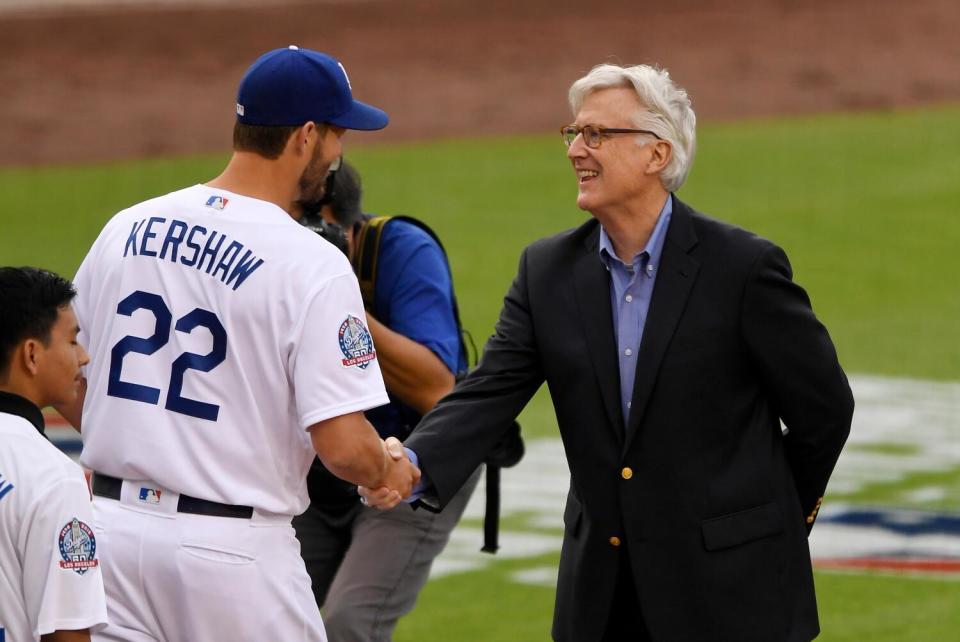Hernández: It's time for Mark Walter to show he really is the Dodgers' controlling owner

Three years ago, on a makeshift stage at Globe Life Field in Arlington, Texas, Mark Walter celebrated his greatest moment as Dodgers owner.
The Commissioner’s Trophy was in his hands. The Dodgers were World Series champions.
Shortly after Walter passed the 30-pound sterling silver piece to Andrew Friedman, a television broadcaster asked him what the championship meant for the city of Los Angeles and the franchise. Instead of answering the question, Walter unfolded a sheet of paper and started reading.
“All of us have been called on,” Walter read at some point, “to heal divides and address inequality that has torn our communities apart for too long.”
Was he reading the wrong speech?
Walter went on like this for more than three minutes.
“This is more than just a trophy,” he said. “This championship is a tribute to [the] resilience of this organization, the people of Los Angeles and the people of the United States of America.”
Team employees cringed. What they had known for years was now being broadcast to the world.
Their owner was out of touch.
The self-indulgent display subjected Walter to some behind-his-back mockery in baseball circles, but the billionaire’s lack of feel was, for the most part, viewed as harmless. The Dodgers had played in three of the last four World Series at that point.
Today, the absence of leadership feels like a problem.
The Dodgers are heading into their most important offseason in recent memory, and Friedman, the president of baseball operations, sounds as if he intends to double down on an approach that produced 100-win teams that crashed out of the divisional round of the postseason in consecutive seasons.
Read more: Shaikin: Trevor Bauer wants back in the majors. Will any team even consider signing him?
Where is the owner to challenge Friedman on his philosophy?
Where is the owner to interject common sense into the conversation?
Where is the owner to reopen his checkbook and implore the baseball operations department to spend whatever it takes to ensure the Dodgers don’t have another year like this?
Walter is the controlling owner of the Dodgers. He’s the person in charge. He has to start acting like it.
The team’s circumstances require an owner who treats the Dodgers as a passion, not just one of the countless assets under the control of his Chicago-based financial services company, Guggenheim Partners.
In the early days of Guggenheim Baseball Management’s ownership of the Dodgers, Walter was a regular presence at Dodger Stadium. Over time, he’s been seen at the ballpark less and less. This season, he attended only a handful of games. A recent request by The Times to speak to Walter was rejected by the Dodgers.

In Walter’s absence, the once cutting-edge baseball operations department has become a caricature of itself, now paralyzed by its insistence on winning every deal. Friedman once said that taking a rational approach with every free agent will cause a team finishing third in the bidding each time, but he has nonetheless remained conservative in his pursuit of high-end players. The Dodgers won’t do anything significant unless a bargain is involved.
Instead of using their financial resources to dictate the free-agent and trade markets, the Dodgers have allowed the markets to dictate what they can and can’t do. That’s why they didn’t acquire any impact players last winter. That’s why they didn’t make any notable additions at the trade deadline this year or last year. Friedman might be right about the playoffs being a crapshoot, but the Dodgers have made them more so with their inaction.
Why can’t the Dodgers have it all? Why can’t they utilize both their smarts and their financial wherewithal? Why can’t they build a roster that has both the necessary depth to win in the regular season and the premium talent to triumph in October? Why can’t they construct a team that is designed to maximize both their short- and long-term chances?
Walter should demand answers.
Read more: Dodgers Dugout: Steve Sax will answer your questions
The owner can’t expect Friedman or team president Stan Kasten to provide any real insight. What employee would tell on him or herself?
For Friedman and Kasten, it’s convenient that Walter remains an absentee owner. As long as Walter maintains his distance from the team, none of them will be held accountable, and Friedman can continue spouting the kind of nonsense he did last week when he claimed the Dodgers had enough pitching to win in the playoffs.
This winter, Walter will presumably have a chance to join other team officials to meet with the Dodgers’ No. 1 free-agent target, Shohei Ohtani, just as he did with Bryce Harper before the 2019 season. An owner can have an enormous impact on these talks, and not just because he’s the person who cuts the check. An owner can embody what an organization is about. An owner can provide a vision. Walter can be that owner, but he’ll have to do more than he’s doing now. He’ll have to care. He'll have to learn about his team. And he’ll have to show it.
Sign up for more Dodgers news with Dodgers Dugout. Delivered at the start of each series.
This story originally appeared in Los Angeles Times.

